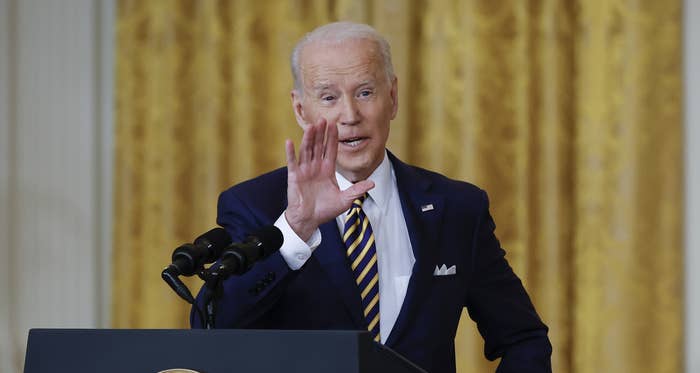
One year after taking office and seeing Senate Republicans block most of his policy agenda, President Joe Biden said he “did not anticipate” their obstructionism and conceded that he will need to break up his wide-ranging social program and climate change bill to get it passed.
"I did not anticipate that there'd be such a stalwart effort to make sure that the most important thing was that President Biden didn't get anything done," Biden said in a press conference on Wednesday, marking his first year in office.
Biden has in recent weeks more bluntly criticized Republicans stymying his policy agenda, particularly as he has come under pressure from voting rights leaders to push through voting reforms before the midterm elections, and contends with ongoing low approval ratings. The White House has said for months that the American people will ultimately judge Democrats on what they’ve achieved in terms of legislation that affects their daily lives.
“Think about this: What are Republicans for? What are they for? Name me one thing they’re for,” he said on Wednesday.
Earlier this month, he directly called out former president Donald Trump for pushing election conspiracy theories, and last week he criticized Senate Republicans for blocking voting rights legislation. On Wednesday, he admitted that he had hoped to be able to foster greater cooperation between the two parties than he has.
"One of the things I haven't been able to get done is to get my Republican friends to get in the game of making things better in this country,” he said, denying that he had overpromised on his agenda early on.
Running for office on the heels of a president who frequently pushed divisive rhetoric and inflamed tensions between Americans, Biden ran on a platform of being able to bridge partisan gaps and get things done in Washington. On the campaign trail, he often referred to his 36 years in the Senate working across the aisle and took pains to reiterate his view that Republicans at large were not the enemy.
In his victory speech in November 2020, Biden made the case that Americans across the political spectrum — including Democrats and Republicans in Congress — should learn to cooperate again.
“The refusal of Democrats and Republicans to cooperate with one another is not due to some mysterious force beyond our control,” Biden said. “It’s a decision. It’s a choice we make,” he said in that speech.
On the campaign trail, he struck an even more conciliatory tone, telling reporters in December 2019 that he didn't want the Republican party to be totally "clobbered."
"I'm really worried that no party should have too much power," he said. "You need a countervailing force,” he said at the time.
Black voting rights advocates have been frustrated to see the administration’s lack of progress on federal protections while Republican-led state and local governments enact dozens of restrictive voting laws across the country. In particular, grassroots advocates have felt that Biden has neglected an issue of vital importance to the same people — Black voters in the South — who helped him gain office in the first place.
“You had President Biden saying that he understood that Black people were the reason why he was elected, and in fact, Black people turned out to vote in huge numbers,” said Amara Enyia, policy and research coordinator for the Movement for Black Lives, calling Biden blaming Republicans for not getting voting rights passed “kind of a cop-out.”
“It's quite disappointing considering the rhetoric that they use to get people engaged in the process during election season,” she said.
“Now we find we’re in this 11th hour with these debates happening and it’s not looking promising. It’s really disappointing. But I think it’s pretty illustrative of the Biden administration’s term so far,” she said.
Another voting rights advocate, Ash-Lee Woodard Henderson, a Movement for Black Lives spokesperson and director of the Highlander Research and Education Center, said the White House’s messaging that advocates on the ground aren’t aware of the difficulty of passing voting rights is “insulting.”
“Prioritizing bipartisanship over the very lives of the people that fought to get him into office, right, and I worry that if he doesn't put up, what it's gonna look like in the midterms for our people,” she said.
Maurice Mitchell, national director of the Working Families Party, said that while the American Rescue Plan and other initiatives did provide relief for Black communities in the midst of the pandemic, voting reform and criminal justice reform are central to the promises Biden made to the Black voters who helped him win the presidency.
Biden, asked about these criticisms from Black voters on the ground on Wednesday, was defensive — and put their frustration down to a lack of communication on his part to the public about his conversations behind the scenes to shore up Democrat support for the legislation.
“I've had their back, I've had their back my entire career, I’ve never not had their back,” he said.
“I’m sure there are those who are saying ‘Why didn’t Biden push the John Lewis bill as hard as he pushed it last month? Why didn’t he push it six months ago as hard as he did now?” Biden said. “The fact is that there is a timing that is not one’s own choice, but dictated by events happening in-country and around the world on what the focus is.”
“I find myself in a position where I don't get to go out and look people in the eye … to connect with people, to let them take a measure of my sincerity,” he added.
Mitchell said that while he appreciated Biden and Harris traveling to Georgia last week to speak on voting rights, and that those kinds of pushes are also important, for Black voters “it's only as important in the context of action.”
